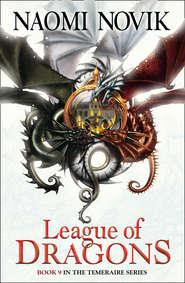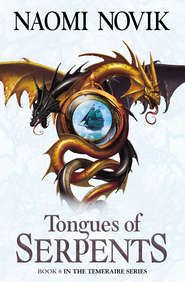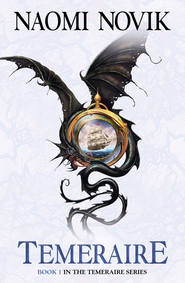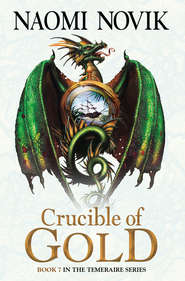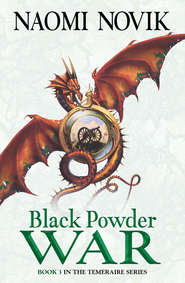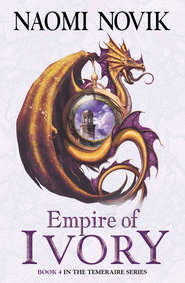По всем вопросам обращайтесь на: info@litportal.ru
(©) 2003-2024.
✖
Victory of Eagles
Автор
Год написания книги
2019
Настройки чтения
Размер шрифта
Высота строк
Поля
‘Oh!’ Temeraire said indignantly. ‘You may not claim any such thing, unless you should like to prove it. I have beaten dragons nearly as big as you.’
Requiescat swung his big head around. ‘Isn't it true you're bred not to fight? Persy was going about saying some such.’
Perscitia gave an angry yelp ‘I never!’ But was quickly stifled by the other small dragons sitting around her at Ballista's censorious glare.
‘Celestials,’ Temeraire said, very coolly, ‘are bred to be the very best sort of dragon. In China, we are not supposed to fight unless the nation is in danger, because China has a good deal more dragons than here and we are too valuable to lose. So we only fight in emergencies, when ordinary fighting dragons are not up to the task.’
‘Oh, China,’ Requiescat said dismissively. 'Anyway chums, there you have it plain as day. I say I am tops, and ought to have the best cave; he says it isn't so, and he won't hand it over. Ordinarily, there'd be no ways to work this out ‘cept with a tussle, and then someone gets hurt and everyone is upset. This is just the sort of thing the council was made up for, and I expect it ought to be pretty clear to all of you which of us is right, without it coming to claws.’
‘I do not say I am tops,’ Temeraire said, ‘although I think it likely. I say that the cave is mine, and that it is unjust for you to take it. That is what the council ought to be for. Justice, not squashing everyone down, just to keep things comfortable for the biggest dragons.’
The council, being composed of the biggest dragons, did not look very enthusiastic. Ballista said, ‘All right, we have heard everyone out. Now look, Teymuhreer,’ she pronounced it quite wrongly, ‘we don't want a lot of fuss and bother—’
‘I do not see why not,’ Temeraire said. ‘What else have we to do?’
Several of the smaller dragons tittered, rustling their wings together. She cleared her throat warningly at them and continued, ‘We don't want a lot of fighting, anyhow. Why don't you just go on and show us a bit of flying, so we know what you can do; then we can settle this.’
‘But that is not at all the point!’ Temeraire said. ‘It ought not make a difference if I were as small as Moncey—’ he looked, but Moncey was not among the little dragons observing, so he amended, ‘or if I were as small as Minnow there. No one was using it, no one wanted the cave before I had it.’
Requiescat gave a flip of his wings. ‘It was not the nicest, before,’ he said, in reasonable tones.
Temeraire snorted angrily. ‘Yes, yes; go on, then; unless you don't like us to see,’ Ballista said impatiently. That was too much to bear. He threw himself aloft, spiralling high and fast as he could, tightening into a spring, and then dived directly into formation manoeuvres, that was what would please them, he thought bitterly. He finished the training pass and backwinged directly, flying the pattern backwards, and then hovered in mid-air before descending sharply. He was showing off, of course, but they had demanded he do so. Landing, he announced, ‘I will show you the divine wind now, but you had better clear away from that rock wall, as I expect a lot of it will come down.’
There was a good deal of grumbling as the big dragons shifted themselves, with dragging tails and annoyed looks. Temeraire ignored them and breathed in deeply several times, stretching his chest wide, as he meant to do as much damage as he could. He noticed in dismay, that the crag was not loose, nor made of the same nice soft white limestone in the caves, which crumbled so conveniently. He scraped a claw down the rockface and merely left white scratches on the hard grey rock.
‘Well?’ Ballista said. ‘We are all waiting.’
There was no helping it. Temeraire backed away from the cliff and drew a preparatory breath. Then there was a hurried rush of wings above and Moncey dropped into the clearing beside him, panting, and said, ‘Call it off; it's all off,’ urgently, to Ballista.
‘Hey, what's this, now?’ Requiescat said, frowning.
‘Quiet, you fat lump,’ Moncey said, narrowing a good many eyes; he was not much bigger than the Regal Copper's head. ‘I'm fresh from Brecon. The Frogs have come over the Channel.’
A great confused babble arose all around, even Gentius roused with a low hiss, and while everyone spoke at once, Moncey turned to Temeraire and said, ‘Listen, your Laurence, word is in they locked him up on a ship called the Goliath—’
‘The Goliath!’ Temeraire said. ‘I know that ship. Laurence has spoken of it to me before. That is very good—That is splendid. I know just where it is, it is on blockade, and I am sure anyone at Dover can tell me exactly where—’
‘Dear fellow, there's no good way to say this,’ Moncey said. ‘The Frogs sank her this morning, coming across. She is at the bottom of the ocean, and not a man got off her before she went down.’
Temeraire did not say anything. A terrible sensation was rising, climbing up his throat. He turned away to let it come. The roar burst out like the roll of thunder overhead, silencing every word around him, and the wall of stone cracked open before him like a pane of mirrored glass.
Chapter Three (#ufc6c6828-520a-5394-bfaf-98803e721660)
They pulled the ship's boats into Dover harbour well past eleven o'clock at night, sweating underneath their wet clothing, hands blistered on the oars. They climbed out shivering onto the docks. Captain Puget was handed up in a litter, almost senseless with blood-loss, and Lieutenant Frye, nineteen, was the only one left to oversee. The rest of the senior officers were dead. Frye looked at Laurence with great uncertainty, then glanced around. The men offered him nothing, they were beaten with rowing and defeat. At last, Laurence quietly offered, ‘The port admiral,’ prompting him. Frye coloured and said to a gangly young midshipman, clearing his throat, ‘Mr. Meed, you had better take the prisoner to the port admiral, and let him decide what is to be done.’
With two Marines for guards, Laurence followed Meed through the dockside streets to the port admiral's office where they found nearly more confusion than had been on the deck of the Goliath in her last moments. After the double broadside had un-masted her, smoke had spread everywhere, fire crawling steadily down through the ship towards the powder magazine, as cannon ran wildly back and forth on her decks.
Here the hallways were suffocating with unchecked speculation. ‘Five hundred thousand men landed,’ one man said in the hallway, a ridiculous number, inflated by panic. ‘Already in London,’ said another, ‘and two millions in shipping seized,’ the very last of these being the only plausible suggestion. If Bonaparte had captured one or two of the ports on the Thames estuary and taken the merchantmen there, he might indeed have reached something like that number. He would have seized an enormous collection of prizes to fuel the invasion, like coal heaped into a burning stove.
‘I do not give a damn if you take him out and lynch him, only get him out of my sight,’ the port admiral said furiously, when Meed finally managed to work his way through the press and ask him for orders. There was a vast roar outside the windows like the wind rising in a storm, even though the night was clear. More petitioners were shoving frantically past them. Laurence had to catch Meed by the arm and hold him up as they fought their way out. The boy could scarcely have been fourteen and was a little underfed.
Set adrift, Meed looked helpless. Laurence wondered if he would have to find his own prison, but then one young lieutenant pushed through towards them, flung him a look of flat contempt, and said, ‘That is the traitor, is it? This way. You dogs take a damned proper hold of him, before he sneaks away in this press.’
He took up an old truncheon in the hallway, and swinging it to clear the way, took them out into the street. Meed trotted after him gratefully. The lieutenant brought them to a run-down sponging house two streets away, with bars upon the windows and a mastiff tied in the barren yard. It howled unhappily, adding to the clamour of the half-rioting crowd. A beating upon the door brought out the master of the house. He whined objections, which the lieutenant overruled one after another, but at last conceded.
‘Better than you deserve,’ he said to Laurence coldly, as he held open the door of a small and squalid attic. He was a slight young man with a struggling moustache. A solid push would have laid him out upon the unkempt floor. Laurence looked at him for a moment, and then stepped inside, stooping under the lintel. The door was shut upon him. Through the wall he heard the lieutenant ordering the two Marines to stand watch, and the owner's complaints trailing him back down the stairs.
It was bitterly cold. The irregular floor of warped and knotted boards felt strange under Laurence's feet, still expecting the listing motion of the ship. There was a handkerchief-square of a window, which at present let in only the thick smell of smoke. Shining rooftops, lit by a reddish glow, were all that he could see.
Laurence sat down on the narrow cot and looked at his hands. There would be fighting all along the coast by now. Men would have landed at Sheerness, and likely along points north, all around the mouth of the Thames. Not five hundred thousand, nothing like that, but enough perhaps. It would not take a very large company of infantry to establish a secure beachhead, then Napoleon could land men as quick as he could get them across the Channel.
This, Laurence would have said, could be not very quickly. Not in the face of the Navy. But that opinion fell before the manoeuvres he had witnessed today. Pitting great numbers of lightweights, easy to feed and quick to manoeuvre, against the British heavyweights, and using their own heavyweights against the British ships flew in the face of all common wisdom. But it bore the same tactical stamp as the whirling attack which he had witnessed at Jena, spearheaded by Lien. Laurence had no doubt her advice had also served Napoleon in this latest adventure.
Laurence had reported on the battle of Jena to the Admiralty. It was a bitter thought to know that his treason had now undermined that intelligence, and likely discredited all his reports. He thought Jane at least would still have kept it under consideration. Even if she had not forgiven him, she knew him well enough to know that his treason had begun and ended with delivering the cure. But from what he had seen of the battle, the British dragons were still locked in the same antiquated habits of aerial war.
The noises outside the window rose and fell like the sea. Somewhere nearby glass was breaking and a woman shrieked. The red glow brightened. He lay down and tried to sleep a little, but his rest was broken repeatedly by ragged eruptions of noise, falling back into the general din by the time he jarred awake, panting and sore. In his dreams, fragmentary images of the burning ship, which became glossy, black scales beneath the flames, curling and crisping at the edges. He rose once. There was a small dirty pitcher of water, but he was not yet thirsty enough to resort to it for a drink. He splashed his face with a cupped handful. His fingers came away streaked with soot and grime. He lay down again, there was more screaming outside, and a stronger smell of smoke.
It did not so much as grow light, as simply less dark. There was a thick sooty pall over the city, and his throat ached sharply. No one came with food, and he received not a word from his guards. Laurence paced his cell restlessly. Four long strides across, three lengthwise from the bed, but he used smaller steps and made it seven. His arms, clasped behind his back, felt as though they were weighted down with roundshot. He had rowed for five hours without a pause.
That at least had been something to do, something besides this useless fretting. The city was burning, and all he could do here was burn with it, or moulder to be taken a prisoner by the French, with Napoleon's army scarcely ten miles distant. And even if he died, Temeraire might never know. He might keep himself a prisoner long for lost cause, and be taken by the French. Laurence could not trust Napoleon with Temeraire's safety, not while Lien was his ally. Her voice, and the self-interest which would prompt him to be the master of the only Celestial outside China's borders, would be more persuasive than his generosity.
The guards might be tempted to let him out by their own desire to be gone, if only Laurence could convince himself he had any right to go. But he had been court-martialled and convicted, and justly so, with all due process of law. Though he would gladly have foregone the dragging out of evidence, he had been condemned already by his own voice. The panel of officers had listened with blank faces, tight with disgust. All were Navy officers, no aviator had been allowed to serve. Too many had been pulled into the vile business, implicated and smeared in any way they could be. Ferris, was singled out because Laurence must have confided in his first lieutenant. ‘And it must present a curious appearance to the court,’ the prosecutor had said, sneering, while Ferris sat drawn and pale and wretched and did not look at Laurence, ‘that he did not raise the alarm for an hour after the accused and his beast were known to be missing, and did not at once open the letter which was left behind—’
Chenery too had been named, and only because he had also been in London covert at the time. Berkley and Little and Sutton, were all brought in to give evidence, and if Harcourt and Jane had not been mentioned, it was only because the Admiralty did not know how to do so without embarrassing themselves more than their targets. ‘I did not know a damned thing about the business, and I am sure nor did anyone else. Anyone who knows Laurence will tell you he would not have breathed a word of it to anyone,’ Chenery had said defiantly. ‘But I do say that sending over the sick beast was a blackguardly thing for the Admiralty to have done, and if you want to hang me for saying so, you are welcome.’
They had not hanged Chenery, thank God, for lack of evidence and for need of his dragon, but Ferris, a lieutenant with no such protection, had been broken out of the service. Every effort Laurence had made to insist that the guilt was his alone had been ignored. A fine officer had been lost to the service, his career and his life spoilt. Laurence had met his mother and his brothers. They were an old family and proud. But Ferris had been away from home from the age of seven, so they did not have that intimate knowledge, which should make them confident of his innocence, and replace the affectionate support from his fellow-officers now denied to him. To witness his misery and know himself culpable hurt Laurence worse than his own conviction had done.
That had never been in any doubt. There had been no defence to make, and no comfort but the arid certainty that he had done as he ought. That he could have done nothing else. It offered scarce comfort, but saved him from the pain of regret. He could not regret what he had done, he could not have let ten thousand dragons, most of them wholly uninvolved in the war, be murdered for his nation's advantage. When he had said as much, and freely confessed that he had disobeyed his orders, assaulted a Marine, stolen the cure, and given aid and comfort to the enemy, there was nothing else to say. The only charge he contested, was that he had stolen Temeraire, too. ‘He is neither the King's possession nor a dumb beast. His choice was his own and it was freely made,’ Laurence had said, but he had been ignored, of course. He had scarcely been taken from the room before he was brought back in again to hear his sentence of death pronounced.
And then it had been quietly postponed. He had been hurried under guard, from the chamber and into a stifling, black-draped carriage. After a long rattling journey ending at Sheerness, he had been put aboard the Lucinda and then transferred to Goliath. He had been confined to the brig, an oubliette meant only to keep him breathing. It was a living death, worse than the hanging he was promised in future.
But that was not his choice to make. He had made one choice, and sacrificed all the others. His life was no longer his own, even if the court chose to leave it to him a little while longer. To flee now would be no more honourable than to have fled straight to China, or to have accepted Napoleon's solicitations. He could not go. He had no other way of believing himself loyal, he could make no other reparation. He might look at the door, but he could not open it.
A brief glaze of rain washed the window and thinned the smoke outside. He went to stand by the glass, though he could not see anything but a grey dimness. The sun, if it had come up, stayed hidden.
The doorknob rattled and the door opened. Laurence turned and stared at the man on the other side. His lean, travel-leathered face and oriental features were familiar but unexpected. ‘I hope I find you in good health,’ Tharkay said. ‘Will you come with me? I believe there is still a danger of fire.’
The guards had vanished. The house was entirely deserted, but for a couple of men who had wandered in drunk off the street and were sleeping in the front hall. Laurence stepped over their legs and out into the morning. A thin pallid haze of smoke and false dawn lay over the docks, drifting out to sea. Glass, broken slate and charred wood littered the street, with other unspeakable trash. Sweepers lugubriously pushed their brooms down the middle of the lane, doing little to help.
Tharkay led Laurence down a side alley where the dead body of a horse, stripped of saddle and bridle, blocked the way. A young kestrel with long trailing jesses was perched on its side, occasionally tearing at the flesh and uttering satisfied cries. Tharkay held out his hand and whistled, and the kestrel came back to him, to be hooded and secured upon his shoulder.
‘I am three weeks back from the Pamirs,’ Tharkay said. ‘I brought another dozen feral beasts for your ranks. In good time, it seems. Roland sent me to bring you in.’
‘But how came you here?’ Laurence said, while they picked their way onward through the unfashionable back streets. The town already looked as though it had been sacked. Windows and doors still intact, were shut tight, some boarded, giving the house-fronts an unfriendly air. ‘How did you know I was in the town—’
‘The town was not the difficulty. The wreckers off the coast knew which way the Goliath's boats had gone,’ Tharkay said. ‘I was here before you were, I imagine. Finding out where you had been stowed was more difficult. I foolishly went to the trouble of obtaining these, first,’ showing Laurence a folded packet of papers, ‘from the port admiral, in the assumption he would know the whereabouts of the prisoner he was assigning to me. But he left me in the hall for over two hours, and quarrelled with me for another. Only when I had his signature did he at last confess to having not the slightest knowledge where you might be.’
They came to a clearing, a courier-covert, where little Gherni waited for them fidgeting anxiously. She hissed at Tharkay urgently. He answered her in the same tangled dragon-language, which Laurence could not understand, and then clambered up her scanty rigging to her back, pointing out the couple of hand-holds Laurence should use to get himself aboard.






